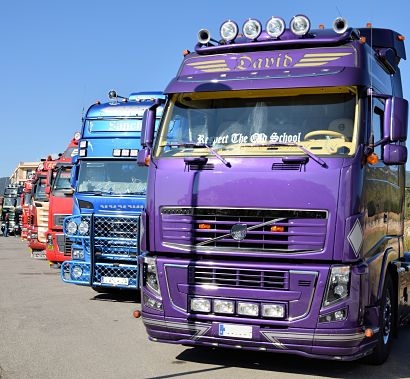
While the focus has been mainly on vehicle electrification for meeting the UK’s net zero target as it applies to road transport, there are still major technical challenges to be overcome to electrify the commercial vehicle sector and, in particular, longer distance road freight.
Heavy Goods Vehicles (HGVs) currently produce around 15 percent of total road transport greenhouse gas emissions (GHGs) with a similar contribution coming from light duty vans. Vehicles with long-haul duty cycles account for the largest portion of GHG emissions from HGVs.
The Renewable Fuels Guide, produced by the LowCVP and Cenex, and supported by CNG Fuels and Scania shows how the adoption of renewable fuels from sustainable feedstocks offers one of the most rapid, and economically viable, routes to lowering emissions for such vehicles, both new and those already in service.
The guide provides fleet operators with an overview of the range of low carbon and sustainable fuels currently available in the UK, with a focus on high blend biofuels for use in commercial vehicles. It demonstrates the business and environmental case for their adoption, featuring a series of fleet operator case studies.
Renewable fuels are mandated for use under UK legislation and are now present (comprising a few percent) in most road transport fuel now sold. The Renewable Transport Fuel Obligation Order (RTFO, 2007) requires large UK retail fuel suppliers to ensure that a minimum of 9.75 percent (by energy) of the fuel they supply comes from renewable sources by 2020, and 12.4 percent by 2032.
The latest figures show that 4.9 percent of total road fuel supplied in the UK currently comes from these sources.
The RTFO requires renewable fuels to meet greenhouse gas emissions and sustainability standards to be eligible under the scheme. The most recent government statistics showed that UK renewable fuel supplied to the market achieved average greenhouse gas emissions savings of 78 percent compared to fossil fuels. (Reference link). Nearly 70 percent of such fuel supplied was from waste feedstocks.
This latest statistics for renewable fuels supplied to the UK market suggested that they contributed an annualised saving of 3,990kt CO2-equivalent emissions; the same as taking 1.8 million cars of the road for a full year. (1.7 million cars if indirect land-use change - ILUC - is accounted for.)
The guide highlights the opportunities for the introduction of renewable fuels including biodiesel, biomethane, biopropane and hydrotreated vegetable oil. It covers case studies from organisations including McDonalds; McGregor Logistics; London Borough of Hackney; Luckett's Travel; John Lewis Partnership; London Borough of Camden; Cornwall Council and Kuehne+Nagel.
“The next decade is going to be critical for mitigating road transport greenhouse gas emissions if we are to meet the 2050 net zero target” said LowCVP’s Head of Projects, Gloria Esposito. “Public and private sector fleet operators are under growing pressure to reduce the carbon footprint of their own activities and those of their suppliers. Renewable fuels can provide an immediate and cost-effective solution to achieving such savings, especially for HGV fleets. Low carbon and sustainable fuels have an important role to play in the near and medium-term to reduce emissions from the commercial vehicle sector, particularly as electric and hydrogen fuel cell solutions in these applications present significant challenges and are at early stages of development”.
Martin Hay, Managing Director of Scania (Great Britain) Limited added that the company offers the widest range of alternatively-fuelled vehicles on the market today and that its trucks and buses are capable of running on bioethanol, biodiesel, biomethane and HVO (Hydrotreated Vegetable Oil). In addition, the company has lobbied extensively to promote the further uptake of renewable fuels, particularly in Europe, and look forward to seeing the use of these sustainable and environmentally-beneficial fuels continue to grow.
For additional information:

